10 facts about global literacy
2. Literacy is a Human Right
3. Literacy Gives Children a Future
4. Education Promotes Equality
5. Literacy Enables Democracy
6. Global Crises Threaten Literacy
7. Illiteracy is not Just a Problem for Developing Countries
8. Eleven Percent of Finnish Adults have Poor Reading Skills
9. Literature Belongs to All Children
10. Literacy Needs Support
1. One in Seven Adults is Illiterate
While the number of illiterate people in the world continues to decline, there are still approximately 773 million people in the world who cannot read. The COVID19 pandemic has also jeapordised many people’s opportunities to learn to read.[1]
As is the case with many other issues, illiteracy is unequally distributed. Nearly half of the world’s illiterate population lives in South and West Asia (47%), and more than a quarter live in sub-Saharan Africa (27%). Most of the world’s illiterate population lives in poverty, and many of them have been impacted by war. The people who most need literacy skills are the ones who have the least access to it.[2]
A person who is illiterate has not mastered the mechanics of reading. Essentially, they have never learned to read. But even if someone isn’t completely illiterate, it can still be very difficult to manage in everyday life if their reading skills aren’t very good. In today’s information society, people need an even better understanding of texts. The faster and ever greater availability of information requires even better reading skills. It’s important to be able to distinguish fact from fiction so as not to be misled. Work and education also require better mechanical reading skills than ever before. We are surrounded by a flood of information, and we must gather it from a variety of sources. [3]
People with poor reading skills may find it difficult to comprehend what they are reading or to grasp the meaning in longer texts. People with poor reading skills find it difficult to manage in their everyday lives and to express their opinions and feelings.
Literary is central premise for an egalitarian world in which everyone has the opportunity to influence their own life and choices. Literary prevents poverty and promotes equality. Literacy is a human right: the right to learn is enshrined in the UN Declaration of Human Rights.[4] That’s why UNESCO, the UN’s Educational, Scientific and Cultural Organization, has set a goal of reducing the number of illiterate adults to no more than 10% of the world’s population by 2030.[5]
The COVID19 pandemic has weakened world literary in many ways. Wars and natural disasters also affect people’s ability to obtain an education and learn to read.[6] That’s why the best guarantee for world literacy is to ensure peace between countries and support stable democratic societies.
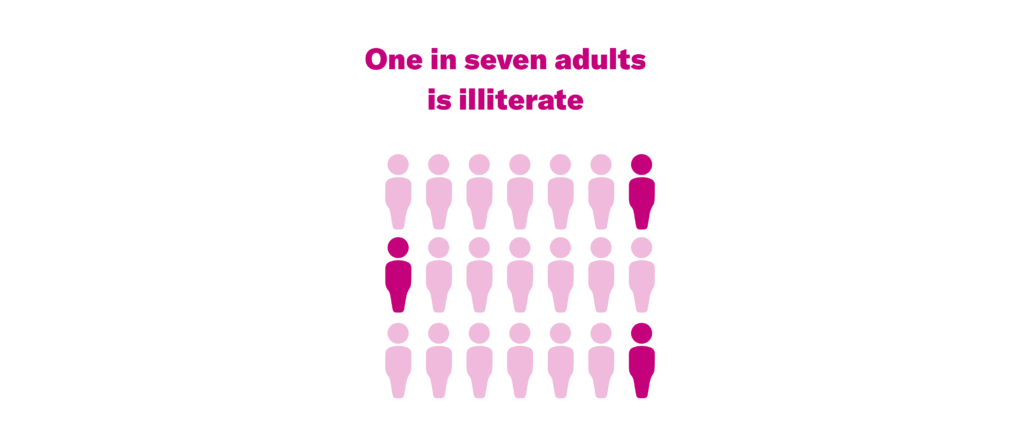
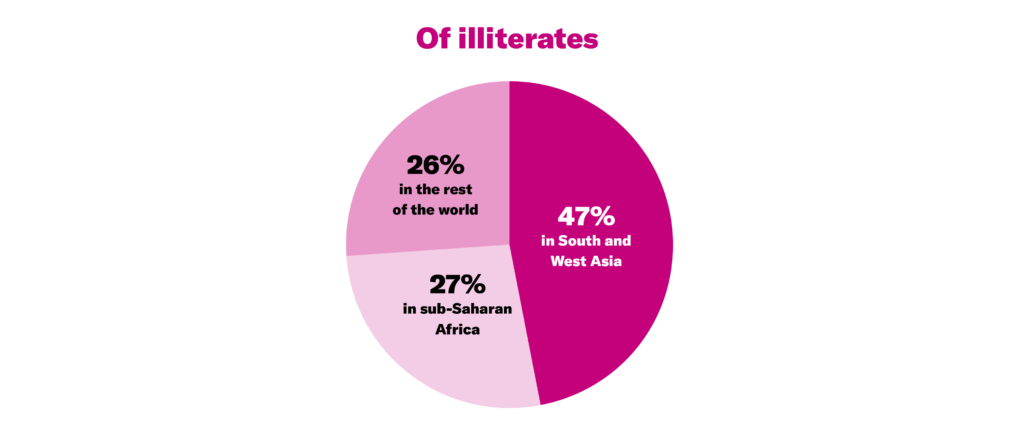
[1] Unesco: “International Literacy Day 2021 – Literacy for a human centred recovery: Narrowing the digital divide” Fact sheet
[2] Unesco: “International Literacy Day 2021 – Literacy for a human centred recovery: Narrowing the digital divide” Fact sheet
[3] Unesco: “International Literacy Day 2021 – Literacy for a human centred recovery: Narrowing the digital divide” Fact sheet
[4]YK:n ihmisoikeuksien julistus
[5]Unesco: SDG 4 – Education 2030, Part II: UNESCO Strategy for Youth and Adult Literacy (2020-2025)
[6] Unesco: “International Literacy Day 2021 – Literacy for a human centred recovery: Narrowing the digital divide”
2. Literacy is a Human Right
Literacy is a human right that makes it possible for individuals to develop and educate themselves and reach their full potential. The right to literacy is enshrined in the UN’s Declaraction for Human Rights.
Literacy is the key to better health and well-being. Literacy is important for gender equality, lasting peace, sustainable development and democracy.[Literacy provides the foundation for many of the skills we need in the ever-changing world around us. That’s why literacy should be seen as every individual’s right and a fundamental principle that promotes the living standards of individuals, families, communities and countries. A literate person is able to influence the course of their own life and the world.[2]
The right to education was enshrined in the UN Declaration of Human Rights in 1948. In accordance with Article 26 of the Declaration, education shall be directed to the full development of the human personality and to the strengthening of respect for human rights and fundamental freedoms. It shall promote understanding, tolerance and friendship among all nations, racial or religious groups.[3]
Literacy is also a stated goal of the UN’s Sustainable Development agenda. The goal of agenda 2030 is to guarantee equal and high-quality education as well as life-long learning opportunities that are open to all.[4]
ELINET, the European Literacy Policy Network, has drawn up the European Declaration of the Right to Literacy which also affirms the right of every European to be provided with the necessary resources and opportunities to develop sufficient and sustainable literacy skills. Technologies are spreading rapidly, and work environments are constantly changing in our 21st century information societies. Developing literary skills is therefore no longer solely tied to childhood and adolescence. It is a lifelong need and requirement.”[5]
The UN’s International Literacy Day will be celebrated on September 8. Its purpose is to remind the international community of the importance of literacy and education so that we can build a sustainable future for all.[6]
[1] YK-liitto: Kansainvälinen lukutaitopäivä[2] ELINET: “European Declaration of the Right to Literacy”
[3] YK-liitto: Ihmisoikeuksien yleismaailmallinen julistus
[4] Ulkoministeriö: “Kestävää kehitystä ja hyvinvointia vuoteen 2030”
[5] ELINET: “European Declaration of the Right to Literacy” Lukukeskus: Elinet – Euroopanlaajuista lukutaitotietoa
3. Literacy Gives Children a Future
Literacy and education promote the equality of children and young people and their future livelihoods. Literacy is the basis for all learning and provides tools for developing one’s own thinking. Children and young people who are illiterate are at risk of being marginalized in society.
When it comes to children’s literacy, it’s most important that children are able to go to school. Many countries have significantly improved children’s access to education, but many children still lack basic skills. If a child does not learn to read, they will inevitably be left behind and will not be able to learn the other important skills taught in school. This often leads children and young people to drop out of school.[1]
Barriers that make learning more difficult for children and young people include large class sizes, insufficient training for teachers, and lack of resources, such as a shortage of textbooks. In the poorest countries, only about 5% of children attain even the most minimal level of literacy. [2]
Of the world’s young people aged 15-24, 8% are illiterate. That means an estimated 100 million young people do not have even the most basic literacy skills.[3] Access to school has improved for children and young people, and compared to adults, more and more children are learning to read. By 2030, 94% of young people are expected to be able to read.[4]
This goal will be achieved by investing in schools and teaching. Teachers should receive adequate training, and all children should have access to school, regardless of their economic status or life situation.
However, access to school has declined dramatically due to the challenges posed by the COVID19 pandemic. (More on this in Fact 6).
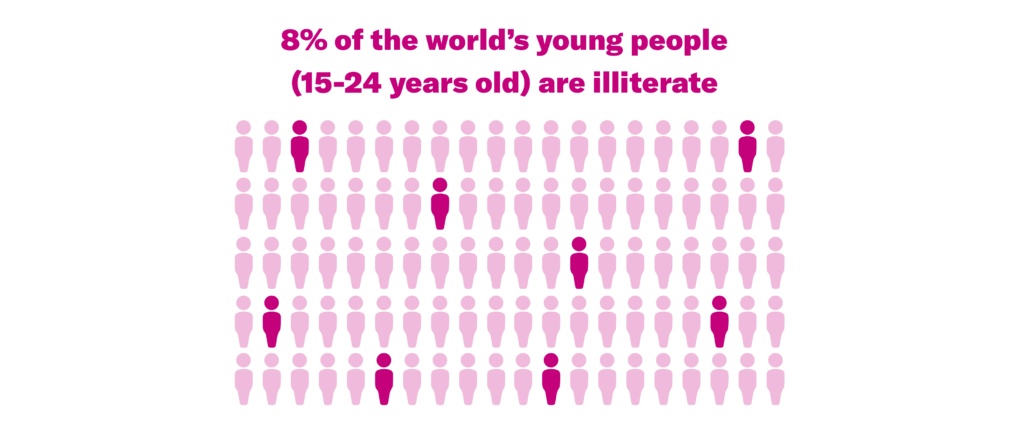
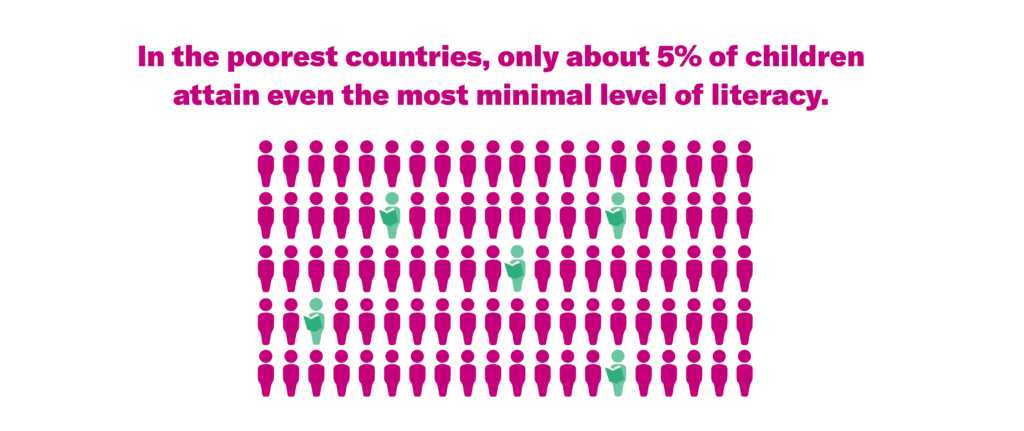
[3] Unesco: “Literacy for a human centred recovery: Narrowing the digital divide”
[4] Unesco: “Literacy for a human centred recovery: Narrowing the digital divide”
4. Education Promotes Equality
Education is an effective way to increase equality between individuals. Going to school and learning basic skills and becoming literate gives people a better chance to make a difference in their own lives.
The world is becoming more unequal: the gap between the rich and the poor and the educated and the uneducated is growing ever wider. The unequal distribution of wealth, rights, and skills makes it even more difficult to end poverty and exclusion. Illiteracy is often passed down from one generation to the next and creates a cycle of poverty.[1]
It is easier for educated adults to take care of their health, earn a living, enable their children’s education and make an impact in their communities. Educated adults are not only more likely to find employment, but being literate also allows them to work in safer conditions and on better terms. Literacy provides greater opportunities to influence politics, social issues and democracy.[2]
Education and literacy benefit everyone, but it is worth investing in the education of women and girls in particular. In the past, boys were more likely to go to school than girls, but fortunately today, everyone’s education is considered equally important. Too often, however, girls end their schooling earlier than boys do, and this is also reflected in statistics. Globally, more than 60% of those who are illiterate are women.[3]
Women who are literate are healthier and more active members of society, and they also tend to marry later and have fewer children. Educated women are better able to take care of their children and their health and provide for their future. Infant mortality, child famine and various life-threatening illnesses would all be significantly reduced if all mothers were allowed to finish primary school.[4]
Free, high-quality and comprehensive education should be equally accessible to all, regardless of one’s gender, religion, language, ability or economic status.[5] Providing equal education to all is also important to help prevent climate change. Education increases awareness about the environment, helps to promote more sustainable use of water and energy, and prepares us for the consequences of climate change.[6]
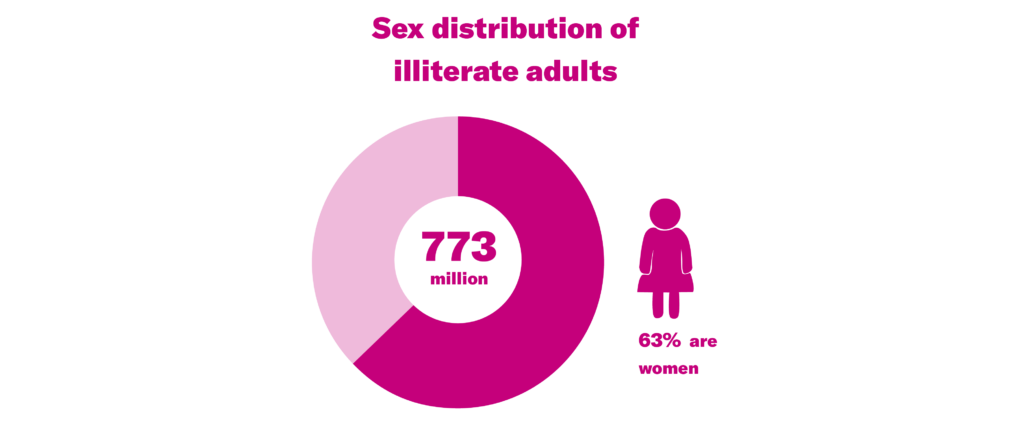
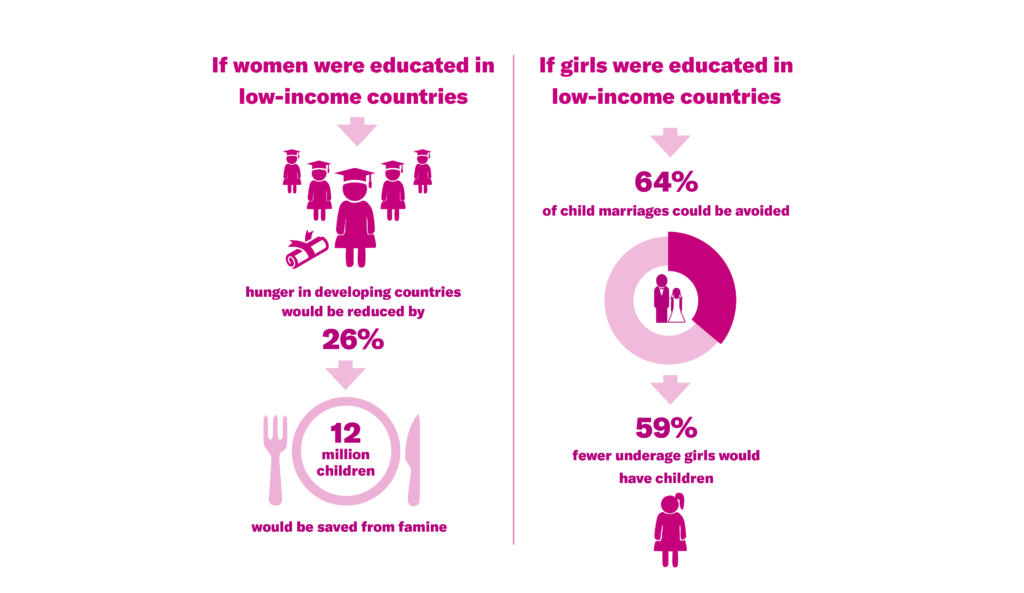
5. Literacy Enables Democracy
Literacy increases opportunities to influence equally. A person with adequate literacy skills is able to critically evaluate information. It is important that people have access to credible and objective information in addition to having strong literacy skills.
Literacy can be misused even in countries with a high level of literacy. Critical literacy skills can’t be taken for granted. There is a need for multiliteracy skills that help people to critically evaluate information from different sources, understand cause-and-effect relationships, and form their own opinions.
In today’s society, citizens are in danger of falling victim to persuasive influencing. Fake news, distorted information and/or restriction of access to objective information may influence our opinions and understanding of different topics.[1]
Sometimes the problem is that there is no reading material available, or it simply does not exist. For example, there may be little or no literature available at all in an indigenous language, but the right to use one’s own mother tongue can also be taken away from children for political reasons. [2] [3]
According to Plan International’s global study on girls’ access to information, seven out of ten girls between the ages of 15-25 have never been taught how to identify misinformation. 91% of survey respondents were concerned about mis- and disinformation on the internet, and 40% of respondents were extremely concerned. [4]
A study undertaken in the UK found that only 2% of children can distinguish fake news from real news. Half of the children surveyed were worried about not being able to recognise false news, and two thirds of survey respondents indicated that they rely less on the news today because of the proliferation of fake news. Two thirds of teachers surveyed are worried that fake news will affect children’s well-being and increase anxiety.[5]
Most information flows through traditional media channels and the internet. In the early days of the internet, people thought that it would create new opportunities for democratic engagement. Today that consensus no longer exists. As a platform, the internet has turned out to be more sensitive to persuasive influencing than initially thought. [6]
Picture from the Finnish Library Association: Resources to help identify fake news can be found in libraries, among other places, which actively work to provide reliable information. [7]
[2] Literacy for life: shaping future agendas and Education for Democracy
[3] UNESCO strategy for youth and adult literacy (2020-2025)
[4] Plan International (2021). The truth gap. How misinformation and disinformation online affect the lives, learning and leadership of girls and young women. Plan International
[5] Fake news and critical literacy: Final report 2018, National Literacy Trust, UK
[6]Internet ennen ja nyt: Tekno-optimismista teknofobiaan. Politiikasta-lehti, 8.6.2021
6. Global Crises Threaten Literacy
There are now a record number of people fleeing conflicts around the world. It is a major challenge to support the education of children and young people in the midst of such crises.[1] Due to the Covid19 pandemic, it is feared that millions of children will drop out of school altogether.
The Covid19 pandemic has also made it more difficult to attend school. Before the pandemic, about 90% of primary school-aged children were at least enrolled in school, and about 20 million children were expected to improve their literacy skills. As a result of the pandemic, 168 million children have dropped out of school, and 100 million children have not acquired the minimum level of literacy.[2]
The pandemic has had a disproportionate impact on the most vulnerable children and young people, and particularly on those in the poorest countries. In the midst of this pandemic, teachers were hampered by the lack of free distance and digital learning materials as well as their own insufficient digital skills and the lack of training opportunities. [3] Much work has been done around the world to get children back into schools, but it has proven to be particularly challenging to get girls back into schools.[4]
The Covid19 pandemic has had an impact on over 1.6 billion students and 100 million teachers in over 190 countries.[5] Many countries provided instruction over the radio and on television, but it is estimated to have reached less than 50 percent of primary school-aged children. Many children who were already at risk of being excluded were left with no source of support. Distance learning has in large part only been available in the main languages, so speakers of minority languages are at greatest risk of being left behind.
In addition to the pandemic, wars and natural disasters make it difficult for children and young people to attend school and develop their literacy skills. If conflicts are prolonged, children may end up without the basic skills they need in today’s world. It is difficult to overcome crises without education, and children and families find themselves in an even more precarious position.[6]
[2] COVID-19 ‘biggest global crisis for children in our 75-year history’ – UNICEF
[3] Unesco: “International Literacy Day 2021 – Literacy for a human centred recovery: Narrowing the digital divide” Fact sheet
[4] Unesco: What’s next? Lessons on Education Recovery: Findings from a Survey of Ministries of Education amid the COVID-19 Pandemic
[5] Unesco: What’s next? Lessons on Education Recovery: Findings from a Survey of Ministries of Education amid the COVID-19 Pandemic
7. Illiteracy is not Just a Problem for Developing Countries
Even if someone has learned to read, their reading skills may remain at such a rudimentary level that it will make it difficult for them to cope in everyday situations and in society.
In Europe alone, it is estimated that 73 million adults have poor reading skills. That amounts to about one in five persons over the age of 15.[1] In the United States, it is estimated that over half of all adults are below the reading level acquired in primary education.[2]
Having an adequate level of literacy ensures that people are able to deal with everyday situations and are able to evaluate information and understand the full context. For example, reading a newspaper, understanding instructions or filling out forms can be difficult for those with poor reading skills. The increasingly digital media environment also continuously requires us to improve our literacy skills.
According to a British study, workers with poor reading skills rarely apply for literacy programs or other support measures. Organisations also tend to adapt their activities to compensate for the poor skills of their employees instead of taking steps to support the development and improvement of literacy in their employees.[3] Poor literacy skills can thus be easily hidden, even though it can reduce productivity.[4] In the United States it’s been estimated that if all adults achieved a sixth-grade level literacy, the benefit to the U.S. could be as high as 2 billion USD per year.[5]
Having good literacy skills can only be achieved by reading. Reading also strengthens creativity and the imagination and is a source of knowledge. Reading deepens our understanding of complex issues, expands our thinking and generates new ideas. Reading fiction in particular can help us understand other people’s thoughts and feelings.[6] That’s why it is worth nurturing and strengthening our literacy skills throughout our lives.
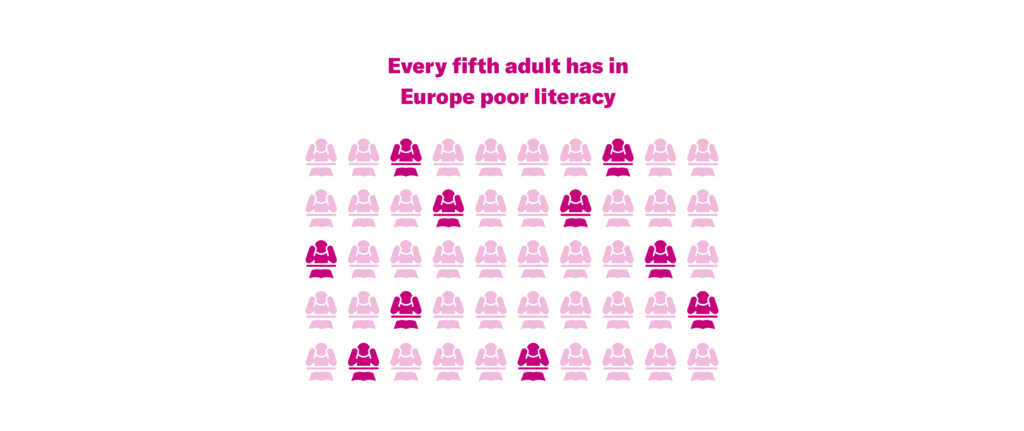
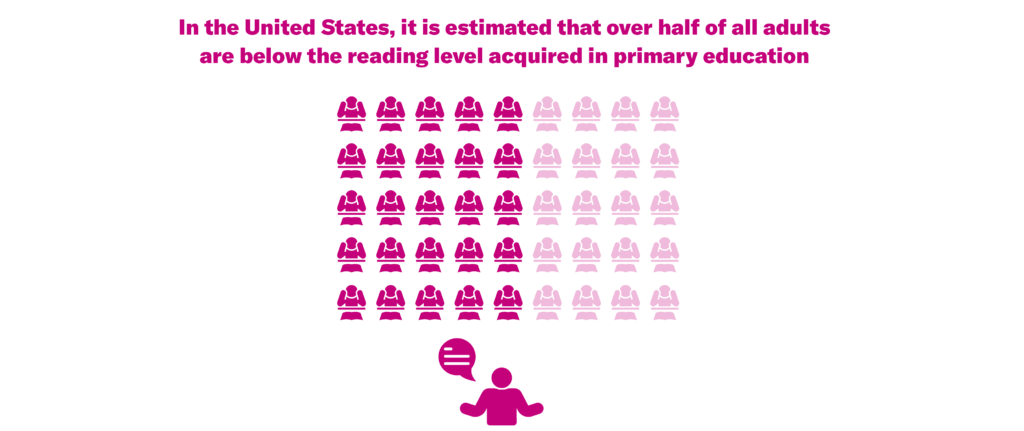
[1] EU Read: “Reading is the basis”
[2] Barbara Bush Foundation: “Via Forbes – New Study Finds the U.S. Could Be Losing $2.2 Trillion Annually Due to Low Adult Literacy Rates”
[3] Mallows & Litster: Literacy as supply and demand. Zeitschrift für Weiterbildungsforschung – Report. Journal for Research on Adult Education. Volume 39, nr. 2. 2016
[4] Carpentieri, J.D., Colahan, M., Hale, C., Litster, J., Mallows, D., & Trinh, T. (2016b). Impact of poor basic literacy and numeracy on employers BIS research paper number 266. London: BIS.
[5] Barbara Bush Foundation: “Via Forbes – New Study Finds the U.S. Could Be Losing $2.2 Trillion Annually Due to Low Adult Literacy Rates”
8. Eleven Percent of Finnish Adults have Poor Reading Skills
On an international scale, the average literacy skills of Finnish adults are excellent,[1] but even in Finland there are more and more adults who need help reading and understanding what they have read.
Eleven percent of Finnish adults have poor reading skills.[2] It is estimated that up to 750,000 people, or 14% of Finns, need access to easy read texts. The need for easy read language for those who have difficulty understanding standard language has increased by about 100,000 people in the last five years.[3]
Literacy is affected by a variety of factors in an individual’s life, but when it comes to adult literacy, age and level of education are the key factors. There are more people with poor reading skills represented in older and less educated groups.[4]
The reasons for poor reading skills vary. Not everyone who is less proficient in reading has dyslexia. However, reading fluency is hereditary; the probability of a child having dyslexia increases fourfold if someone in the family has it. About 5-10% of the Finnish population has dyslexia. Dyslexia can be predicted in early childhood, and early support measures can alleviate the effects of dyslexia in adulthood.[5]
The level of literacy among young people is also declining. In particular, the number of young people in Finland who read has collapsed.[6] In the latest PISA survey of ninth graders, Finland was one of the three countries with the highest decline in interest in reading. Therefore working to awaken young people’s interest in reading should be the main goal to increase reading.
In Finland there are more and more people whose native language is something other than Finnish, Swedish or Sami. It is predicted that by 2035, one in four residents in the Helsinki region will speak a language other than Finnish, Swedish or Sami as their mother tongue.[7] In 2019, 7.5% of the population had a language other than Finnish, Swedish or Sami as their mother tongue.[8] In Finland, basic education is provided in almost 50 different languages.[9] In a functioning multilingual society, it is important to recognise that different languages exist side by side in different situations. A prosperous, multilingual and diverse population is a rich resource for the Finland of the future.
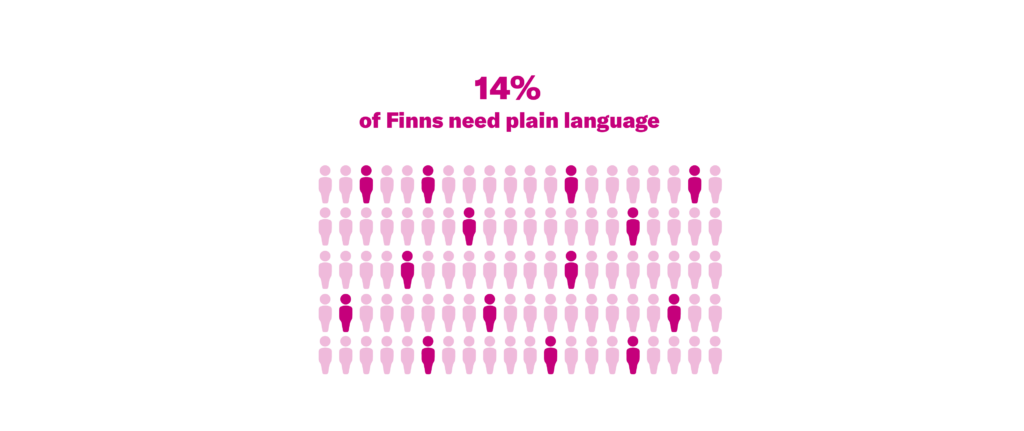
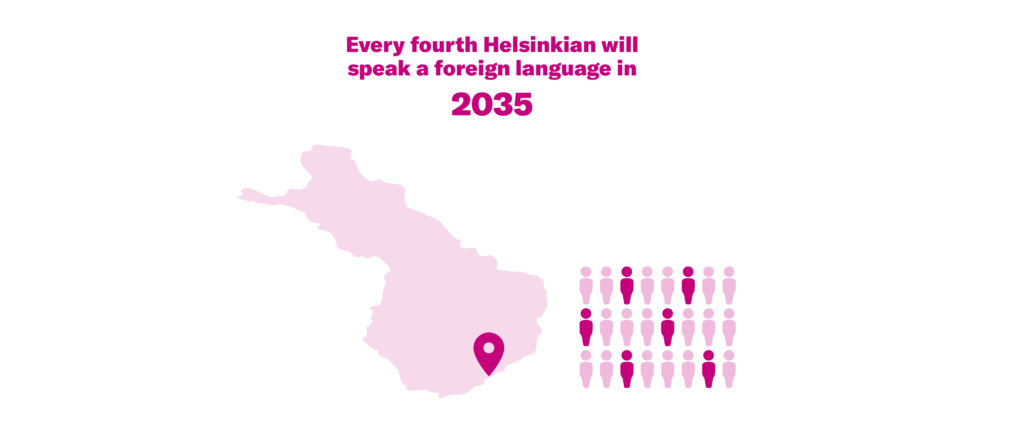
[1] PIAAC 2012. Kansainvälisen aikuistutkimuksen ensituloksia
[2] PIAAC 2012. Kansainvälisen aikuistutkimuksen ensituloksia
[3] Juusola, Markku; Selkokeskus, Kehitysvammaliitto ry: Selkokielen tarvearvio 2019. Kehitysvammaliitto 2019
[4] Esim. Sulkunen & Malin: Literacy, Age and Recentness of Education Among Nordic Adults. Scandinavian Journal of Educational Research, 62 (5), 929−948. 2018
[5] Esim. Lukimat
[6] Suomen virallinen tilasto (SVT): Vapaa-ajan osallistuminen. Lukemisen muutokset 2017, Helsinki: Tilastokeskus
[7] Helsingin kaupungin tietokeskus 2019: “Helsingin seudun vieraskielisen väestön ennuste 2018–2035”
[8] Tilastokeskus 2019
[9] Tainio, Lisa ym.: Koulujen monet kielet ja uskonnot. Valtioneuvoston kanslia.
9. Literature Belongs to All Children
The best way to support a child’s developing literacy skills is to read to them regularly from birth. Reading aloud supports learning and develops language skills.
The benefits of reading aloud to children are recognised globally. In many countries, however, children’s reading falls behind other everyday concerns. It can also be hard to find age-appropriate books for children. In sub-Saharan Africa, only 3% of homes have more than two children’s books. Worldwide, less than half of parents say they can support their children’s learning by reading to them.[1]
If children have at least one book at home, their chances of learning basic skills doubles. The availability of children’s books and educating parents about the importance of reading has a direct impact on bridging the learning gap and providing more equal opportunities for children. Too many children grow up without moments spent reading together with their families and so are left without important support for speech development, vocabulary building and learning to read. Not having these early skills dramatically impacts a child’s ability to learn. [2]
Ensuring access to children’s books and encouraging and supporting reading in families are also top goals of the World Bank’s Early Learning Programme. The Read@Home programme aims to increase reading in families and brings children’s books, games and learning materials to hard-to-reach families in 13 different countries, including Senegal, Nigeria, Uzbekistan and Honduras. If it is difficult to get to school, reading at home is a good way to ensure a child is continuously learning.[3]
The UN Convention on the Rights of the Child also enshrines the right of children to be informed about issues that affect their lives. To this end, states that are party to the agreement are encouraged to produce and distribute children’s literature.[4]
Finland supports equal opportunities for family reading through campaigns such as the Finnish Reading Center’s Read Aloud programme. All families with babies in Finland are given a book bag as part of their regular visits to the maternal and child health care clinics. In Finland, evening fairy tales are considered every child’s right, and this tradition has also been added to Finland’s national list as part of UNESCO’s Intangible Cultural Heritage of Humanity.[5]
[1] World Bank: “Read@Home: Delivering reading, learning materials and parental support to hard-to-reach homes”
[2] Read@Home: Deliverins reading, learning materials and parental support to hard-to-reach homes
[3] The World Bank
[4] YK:n yleissopimus lastenoikeuksista
[5] Elävän perinnön wikiluettelo: Iltasatu
10. Literacy Needs Support
Finland is a world leader in literacy. Finns’ high level of literacy is a privilege that is maintained in many ways. Primary and secondary education in Finland is free and available to everyone. Finland also has one of the largest library networks in the world, thanks to which Finns have access to diverse and multilingual literature.
On a global scale, literacy is a vital survival skill, but there are still many people who remain illiterate. Many organisations in Finland provide support to the disadvantaged so they can learn to read.
These are some of the organisations that support global literacy and children’s access to school in Finland:
You Can Help by Reading
Classrooms that participate in the Reading Month campaign donate the money they fundraise to the Finnish Red Cross Disaster Relief Fund. Donations are directed to relief work in poor, disaster-stricken countries.